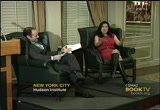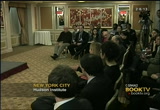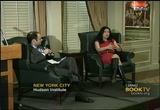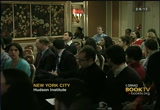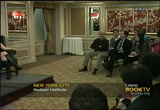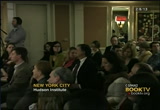tv Book TV CSPAN February 24, 2013 8:15pm-9:00pm EST
8:15 pm
>> it's hard to know there were not informant's involved early on. but for the most part, most were undercover agents but there are these financial incentives for the informants in particular. but even to some degree asians. your performance is based on the case load that you bring in and that is a case whether you get a promotion or a raise and you can make the argument that they are involved in all of these cases and some degree. >> [inaudible] >> there were financial incentives for some of the targets in the cases and that is absolutely true. for example there is a case as i mentioned earlier the informant had offered to enter the $50,000 for them to move forward in the of liberty seven case in particular, they had seven men in miami and they were expecting a money transfer of $50,000 for
8:16 pm
what they believed was al qaeda and it suggested that they may have been as interested in hustling the guy as he was interested in committing an act of terrorism most of the transfers suggest she was quick to say and do anything that allow the bank account and about ultimately never came and the guy involved in the terrorism plot but in that case the gave the note to al qaeda and they seemed to move along with what of the informant wanted and that suggested that they wanted that money. >> we are running out of time that i think it is safe to say that he would be happy to hang around and talk to you individually. i want to thank you once again for doing this gigantic program and these kind of investigations that we learn about the mistakes we might be making and how to do things better. i want to thank all of you for coming out. and if you haven't picked up a copy of the book yet, now you know why you left and grab a
8:17 pm
copy of mother jones and support this wonderful venue. it's an honor to be here tonight. >> i'm flattered and honored and that you are here. thank you everyone for coming and for this event. i will stick around and meet everyone. thanks. [applause] from new york city the former chancellor of the washington, d.c. public school system recounts her career and present your thoughts on education reform. this event is about 45 minutes.
8:18 pm
thank you during much for joining us.laus i know you've had a couple of busy days, jon stewart thise mog morning and we're delighted to have our friend here from c-spah covering this event that manyg t people across the united states can really benefit from a lot ob what michelle has to say. say. just to kickstart this evening, how did you come up with a up fascinating and interesting book "r book, "radical," and where did r this come from? the >> i think the genesis of the ne name is an interesting one ing that when i first got to d.c., rst it was the lowest performing and mostpe dysfunctional school district in the nation and that was a pretty widely known truth. so i started doing things that i thought for obvious to me by started closing work reform and
8:19 pm
schools and moving out in the affected employees, cutting the central office board of bureaucracy in half and as i was taking the measures peopleict in started saying she is ai di firebrand, she's a radical,cl she's soos controversial.es, cut y thought really?people staed ta and coming you know, aftert al thinking about it for a while you know what, it's bringing some common sense to a dysfunctional system makes me as radical, then i am okay with that. so that is sort of embracing the co concept for the name of the book.t: some ople >> some people call you an antiteacher but there are some that like you. what is it to you think, theyy love you or haiti or is there and in between? you? >> guest: it depends on
8:20 pm
my grandfather was an educator, my grandmother was an educator, mike the teacher you talk to. i think the notion i am anti-teacher is incredibly foreign to me. my grandfather was an educator, my grandmother, four of my aunts, a sister-in-law, a best friend, i grew up around teachers and having incredible respect for the difficult job they have every day and still surrounded by teachers to this day. because i have such respect to hold them in such regard regard, i have a tremendous relief for what they can do and the power they have. refuse to believe that if kids come from difficult situations and poverty there is nothing the schools can do. i roundly reject that notion. i believe when children are
8:21 pm
in the classrooms of to the effective teachers, despite the fact they face obstacles, they can achieve that the highest levels. we should aspire to nothing short to make sure every single kid is in the classroom every single day. no less than what we wanted for our own children for what we should want from our nation's kids. >> to spend the most per-capita per student, why is america's children 25 that of 30th in math, 17 in science and 14th in reading? >> when i sure those statistics they cringe. when i share the fact 25th in math and some of the countries that are ahead of us are hungry and slovenia. i think of americans we
8:22 pm
don't expect to be behind them in any measure. two years ago somebody showed me a scatter plot of all of the developed nations in the country and on one access to academic achievement levels of students the other was the amount of money country spend per child and we were in accord drench you don't want to be spending a lot of money for results deal neither country in that quadra and with us was luxembourg. i have no idea what they're doing. the problem is for decades now people have been pushing the idea to fix the system is more money more many more money. but i knew firsthand that was not the case weavers' spending more money than any of your jurisdiction yet
8:23 pm
results were at the bottom with districts right across the river in newark, new jersey spending $22,000 per kid yet operating with the full proficiency in the single digits so to throw more money into a broken system with a different result is faulty. we have to have the transparency where the dollars are going to stop spending money on things that have no impact on kids. when i was in washington d.c. the had a digit of $1 billion per year. of that, a 403, 403 million went into the schools so the majority of the money went into a bloated bureaucracy. that is not where you have the impact it has the impact
8:24 pm
in the classroom not from the district itself salt and tell lee should delight current and what kind of return on investment are we getting, i think we will continue to live where we spend more money but don't get the results. >> you talk about students vouchers that you came to the change of rethinking on this topic. >> guest: this topic of vouchers get some people really, really riled up. if you want to have the debate bring of the word facture and we have strong opinions. i am a democrat, i have been my entire life since second grade i ask my dad and he said democrats care more about the people that have less and the republicans want to make more money and i said i am a democrat.
8:25 pm
so when i got to d.c. i have very clear views would education reform should look like and i drove very bright line because we think vouchers are bad because you take away money from the schools and you get the most but when i arrived in washington we had a publicly funded voucher program. it was about to be reauthorize and people said what do you think about it? i knew what i thought but i did not want to jump to conclusions so i started to meet with families and the discussions that i add absolutely change my mind i was meeting with parents throughout the city, mostly low-income single moms and they have done everything
8:26 pm
you'd want them to do. researched the neighborhood's schools, only 10 percent were on grade level so they have an edge percent chance of failure, then they do the next best thing to apply through the out of boundary lottery process to win a spot in a good school on the other side of town then they would lose because only a handful of spots were available then they would come to me now what do i do? when i would look eye-to-eye with these mothers, i knew that i could not offer them a spot at a high performing school could be enough for my own kids i said to mia to take this $7,500 voucher and go to a catholic school where kids get a great education? and i was not willing to say no. i came out and people went
8:27 pm
crazy gnats. what you doing? you are going against the party. i say my job is not to protect and preserve a district that has been doing a disservice to children. my job is to make sure everybody gets a great education. it to be a private school, and a charter school, a traditional school if they get a great education i don't care. i tried to bring my democratic friends along with me on this issue. i was talking to a public schoolteacher the other day she said yes like i am not buying it. i said did you watch the movie "waiting for superman"? she said yes. to remember this scene with bianco looking of the window
8:28 pm
it is tragic and she is crying because she cannot go to school because her mom has fallen behind on tuition payments? what do you think? >> was heartbreaking it was an injustice i wanted to write the check myself i said that would be a voucher. [laughter] this is the problem they think that is republican and democratic but if we stop looking at things with partisan politics in making public policy based on decisions of our own kids we would not have an agenda but distance first agenda that would put our country on a wildly different trajectory. >> you put a lot of emphasis , and teachers improving student performance but what about the critics that say there are factors that they have no control, home
8:29 pm
life, poverty level, etc.? >> guest: they are absolutely right to. we have kids who come to school every day facing enormous challenges. nobody puts them to bet the night before, nobody feeds them breakfast, may be electricity is turned off than they could and do homework, when you face these challenges does it make it harder to learn and to teach? absolutely. 100 percent. but can it be an excuse for why kids aren't achieving? no way. this is what i think, what we have to understand right now is the u.s. rank is towards the bottom internationally on social mobility so if you are a child born into poverty in this country the likelihood you'll ever escape poverty that goes against every a
8:30 pm
deal that we hold as americans that is not the way our country is supposed to work we have the greatest country in the world because if you work hard and do the right thing you can live the american dream but those growing up today the likelihood to go to a failing score was 50% see don't get the skills and knowledge that you need, that is criminal in my mind. we canllow povty tbe in .. with the chances in life outcome. >> host: what about the problem of teaching. [inaudible] >> guest: this is a good question. i see both sides. as a mom last year my daughter was in the fourth grade in the middle of april she came home and i said
8:31 pm
where's your home or? she said we don't have homeric anymore because the test is over. what message does this send to the kids of the parents and the kids say the test is over. there is an overemphasis on the test that is maddening but on the other side i talk to a parent in compton was when extraordinarily frustrated who of the elementary school got straight a's and she was excited because she applied to go to the magnet middle school and was told later her got -- her daughter did not qualify to enter because she did not have the academic skills she needed. she said were you talking about? they said grades are one thing but she took the test
8:32 pm
but she does not know reading comprehension we can show you the data. this mom felt so betrayed, she trusted the system and when her kids came home with good grades that meant something so why wasn't telling me that compared to her peers she could not compete? with a with the over of this but -- overemphasis but we need accountability but the challenge is how do we strike the right balance? we have accountability, we know what we are able to do yet there is not such an emphasis on the test people think that is the end all be all. >> host: the brilliant film "waiting for superman" you are for the teachers' union war many and the union rejected it. by? >> guest: that is what i
8:33 pm
was asking during the movie if you saw the look on my face. when the movie was being filmed, we had presented a plan to the union that said we want to give highly effective teachers to make double the amount of money in the old system if they're willing to give up tenure and protection but it is a choice. if they want to stay in the old system they can't they give up there rights but they will make more money and let them choose and they said no i could not believe it is interesting because the president of the teachers' union at the time now has come to jesus now is the education reformer and he said you know, why i did not support the bill because
8:34 pm
i did know what that policy because i was getting e-mail saying put it to of vote. we want it so i knew i would lose but eventually we got the contract in place. this is interesting, people were very skeptical what kind of impact it would have if you pay more teachers many based on results and a study that just came out a few weeks ago that studied several urban districts across the country and most of these districts be tainted their highly effective teachers and ineffective teachers at the exact same rate with no differentiation the one out wire was washington d.c. where they kept 80 percent of by the effective in 40% ineffective and i said that
8:35 pm
means we are doing is starting to work because the great teachers are feeling more valued and they know they are being recognized for their work and it makes them want to stay. >> host: america's most precious capital as children. but how does merit pay apply to teachers and version more slowly performing teachers be moved? >> guest: it is a tough understanding why this goes on it defies all common sense. >> host: people in the audience have all types of jobs merit evaluation is the type of life it is so important dealing with children and wiser so much resistance to merit devaluation? >> guest: having run a school district three and a half years, much of the
8:36 pm
education committee is allergic to the idea of accountability. people want to say because of this reasoner because of that reason and i think it is extraordinarily problematic for i don't know why but how to think we have to change this. i now live halftime in california which is one of the most difficult states to get anything done with education reform. there is an episode that happened in a public school in the posse angeles where they found this teacher who was basically a sexual predator and showed he was abusing the kids in his classroom and the school district tried to fire him but they couldn't because he had tenure. it was an absolute travesty for the parents were up in
8:37 pm
arms so a legislator from that area introduced a bill to the california legislator that would simply make it easier to fire sexual predators' not even an effective teachers. that is low hanging fruit. it did not even make it out of the education committee. not even out of committee to a vote of the legislature that is how powerful the status quo is to make sure no laws get past. if you ask people today honesty i guarantee virtually everybody would say of course, we should pass a law like that the people in that committee nobody knew that's. there was no public light shone on that and those lawmakers will not be held accountable for those
8:38 pm
decisions for the detriment of children the leeway this will change is if we as a base citizens hold elected officials accountable for the policies put in place and send a message if you vote with adults interest instead of kid interest we will not vote for you the next time. [applause] that means you have to figure out your school board members and state legislature members. >> host: why do most teachers receive the same raise every year? and is in.the motivating for the excellent teachers and doesn't show low performing teachers don't have to improve their own performance regardless to get the same 2 percent raise every year. >> guest: again, you see why i was shocked when i
8:39 pm
tried and got pushed back to some employees are doing well you should be able to compensate them more. that is just not have the education system works. so we have ye to get paid according to your degree in how long you have been in the profession it it it it literally drives heidi effective teachers nets when they see somebody down the hall when the kids come in and then leaves with bacon into hours early and stayed two hours later in produce results but paid less that person has been here longer it is not the kind of environment people want to go into and it doesn't make them feel valued at all. i got into a little bit of trouble the of the night and was giving a speech in california and lamenting the fact teachers to not get
8:40 pm
paid enough. basketball players, and now my husband is a former nba player so this is what i got trouble at home. they are paid $12 million per year for dribbling a ball. [laughter] what value are they getting to society? meanwhile i think we should pay $12 million to our most highly effective teachers because they are determining the future of our nation nation, but we have this skewed culture where we don't actually respect and honor teachers for the incredible work they do and certainly don't pay them what they are worth. >> in australia they have 280 public schools china and india 220 days of instruction and in the united states it is only 180 days? that is drastic between
8:41 pm
china and india 40 +-- per year if you multiply that kindergarten through 12th grade it is a big disadvantage. >> guest: people say what do we need to save the education? in my opinion you have to put every single resource there and it is the resources of time. if you look at the schools in this country whether traditional, a charter schools, they are in school more and have their kids working and after school and on weekends we are still living on the agrarian calendar. literally it is interesting somebodies said on a talk show the other day or applaud that said the u.s.
8:42 pm
is not doing worse than what it was doing before but she is right when you looked at the fact academic achievement levels of the kids in the '60s and '70s is pretty much on par with where we are today. it is true from that vantage point* we're not worse but the problem is there are countries that are leapfrog ahead of fiat the head of west lafayette and liechtenstein are both growing two or three times of american kids. if we stay the same because we run the school system the same way we were 100 years ago based on the agrarian calendar and other countries have figured out to get
8:43 pm
ahead we have to educate the kids and put more time in, then we can read remain the same that we will fall behind with global positioning. >> host: can the average american received two and half weeks of vacation why do public-school teachers received over three and a half months and do you think that will never change to talk about the countries, the length of this school year, and more focus on students? >> guest: it will only change if we make the commitment as a country to address the issue to do something about it. as long as the school calendar is negotiated with the collective bargaining agreement, we are in trouble. in my mind we should set out as a country, our kids need
8:44 pm
to be in school x number of days but because it is collectively bargained and school districts don't have money they can only bargain away the school day or the year is a detriment to the children. you have people who had to go through a four day school week because they did not have enough money to negotiate that is where we have to draw the line. i am for collective bargaining. i am all in favor of unions around salaries and benefits absolutely, a bill when it comes to how long kids should be in school? that should not be a bargaining chip. >> host: it feels there are more chapters in your book wear is students first
8:45 pm
going and what is next for the organization? what you have done in last year's is very impressive. >> guest: i started it when i left d.c. but the idea if you look at what was happening with public education you would see was largely driven by special interest groups, a textbook manufacturers, a teachers' unions, these organizations have tremendous resources and they can use those to put influence on the political process to get the regulations in place. i don't have a problem with that. that is the american way for a of a problem is not the fact that they exist but at that point* we do not have been organized national interest group to advocate on behalf of kids.
8:46 pm
because the kids are not represented at the table you have this huge landscape that was tilted to these interest away from kids. i thought we have to start a national movement of everyday people who care about the education to know the policies to put in place and willing to fight for it. has to be an organization with political muscle. we have 2 million members right now, over when the defective thousand in new york, 300,000 in california california, a very active people. they have been searching for a venue for which they can fight, they found it thrusts we have over one had to 15 flaws in the 17 states over the last two years we have got involved in the electoral college's was over 100 politicians and allow
8:47 pm
win rate of 75% so we are beginning to level the playing field on behalf of kids and we still have a long way to go. >> host. >> guest: average to a nation is $84 from the everyday people parents, teachers, grandpare nts, business owners who know the future of this country is going to be based if we can fix the public education system today. >> host: questions before the book signing i will repeat your question. >> speeeleven
8:48 pm
[inaudible] how do we take that stand when you're -- [inaudible] that is part of the reason why i wrote this. because i want to tell my story and explain to people why i had come to the views i do. part to get teachers and educators to understand that. but partially for the average mom out there who is frustrated
8:49 pm
with what she sees and wants to do something about it and doesn't know how. what i would say is this, take right here in new york city. it doesn't matte r where you sendt your kid to school. whether it's the highest or lowest performing.scho, you have to make the best decision for your kids. said you can do something to fix the situation. so let's take new york city most of you probably know this if you keep up with the news. the city repeatedly lost $300 million in state and federal ait because the union basically refused to implement a rigorous teacher evaluation the union basically refuse to
8:50 pm
implement a rigorous teacher evaluation system. everybody has to be evaluated. everybody has to be held accountable, the way of the world but the fact union refuse to do this and very rightfully mike stood his ground to say no because they wanted the model to just be in place for two years that happened that the of the teacher would be removed and then be referred back the mayor said no. what is the point*? where is the public outcry for that? where are the people picketing in the streets to say you cannot deny our kids $300 million because you refuse to be held accountable to have a reasonable evaluation system in place. this is where students first
8:51 pm
is organizing everyday people like you. you have got to get involved in the process because the legislators in albany, the governor could solve the problems they need to hear from people like you you'll make your decisions with you contribute to the next campaign based on the stance they take no because right now they are not hearing enough from people like you. >> even if reforms are put in place which is the argument we live in a culture where children watch five hours of tv per day this book, testing, internet, hol lywood, and mass media video
8:52 pm
and pop culture and obsession was sports that the very culture is hot style to education. i raised a question what good does it do that the whole culture has to be completely transformed to hear beyond the reports you talk about. >> guest: i am an educator i dunno how to solve all the social ills it is not the kid spending too much time on trees but can't testing dyno corporate ceos as well. there was a study that came out a few months ago done by e. economist at harvard and what they showed, they
8:53 pm
studied over 2 million kids over a 20 year period. what they found is if a child had a highly effective teacher, just one in this 13 years, the earning potential was higher, the likelihood they graduated from high school and went on to college was greater and the likelihood they would avoid a teenage pregnancy was higher. i get there are other problems out there we should try to solve those but we also cannot forget what happened in schools matters a lot. if what we are concerned about is poverty that they face challenges, don't get me wrong but if we want to fix that problem, the best way for somebody to break
8:54 pm
the a generational poverty is to get a quality education. we need to embrace the fact it pays eight -- plays a significant role long term. if we're producing kids that do not have the skills and knowledge necessary to get well paying job common nowadays 50% say they cannot find people who have the skills they need to do mission critical jobs. think about that with this kind of the unemployment rates, half of the employers say they have jobs but they cannot fill them because the education system does not feed those people but that is a difficult course the education to play a large part. >> my question is about
8:55 pm
structural change for someone with a high-school education to go to work in a factory or the auto plant making may be $90,000 per year, those jobs are now gone forever for those people in those families so now that is the low level that they need to attain and nobody talk seriously or talking about the structural problem but instead fighting about it so with the tremendous structural
8:56 pm
change, what do you see? >> guest: we have to bring reason into how public schools operate. it is astonishing how many conversations i am in in public forums so people say you seem to have of kids going to college but not all kids are cut out for higher education and i say excuse me? because the bottom line is if you look at the data, it is very clear the vast majority of the jobs 15 or 20 years from now will require some level of higher education so you say they're not cut out for that you're basically saying they are not going to be able to find a decently paying job. what about me for the future? when i was in dc, remember
8:57 pm
going into a school they had a program that used to be called vocational education now it is called career in technical education. the kids were doing shoe repair. i said really? are rethinking we are preparing them for a profession in shoe repair? we need to think what are the jobs to be available 1520 years from now? clean technology and green technology and technical education should be geared toward those skills of those professions. even what we think of to build skills they could potentially go straight into a profession, it is a wildly different set of skills said what we look back 20 years
8:58 pm
ago and we had not made the shift yet. >> you managed to convince your friends that 50 percent. >> guest: and not 50 percent. >> i am just estimating. >> guest: the amount of the of voucher? >> 50% of with the district is spending. this requires that they could be twice as e. efficient than the school they send their kid to. the argument that the union throws out to try to have the trump card, what about special needs? there is a special answer from each special needs kids counts as two kids so if you
8:59 pm
figure out per-capita spending, and make the calculation in that manner and they have to pre-defined special needs so they get the double voucher when the federal government got 55 percent speed limit there not getting highway money unless you do. congress can do that with federal education money as well. of you do not fully fund tries the bottom quintile you will not get any money if you don't make the requirements down the chain. >> guest: let me first say there are lots of people out there who believe let's have universal vouchers from i don't agree with that. i am for choice not for a choice sake but only when it results in better
83 Views
IN COLLECTIONS
CSPAN2 Television Archive
Television Archive  Television Archive News Search Service
Television Archive News Search Service 
Uploaded by TV Archive on

 Live Music Archive
Live Music Archive Librivox Free Audio
Librivox Free Audio Metropolitan Museum
Metropolitan Museum Cleveland Museum of Art
Cleveland Museum of Art Internet Arcade
Internet Arcade Console Living Room
Console Living Room Books to Borrow
Books to Borrow Open Library
Open Library TV News
TV News Understanding 9/11
Understanding 9/11

















